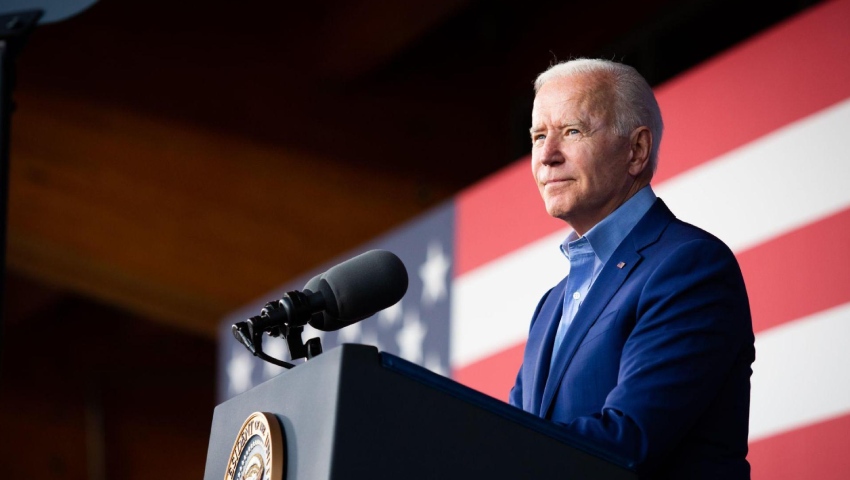Analysts from the US Studies Centre explore whether the AUKUS deal has signalled the start of a bolder US posture in the Indo-Pacific.
To continue reading the rest of this article, please log in.
Create free account to get unlimited news articles and more!
Since assuming power in January, US President Joe Biden has sought to assure allies of the country’s commitment to countering Beijing’s increasingly insidious behaviour on the world stage, particularly its encroachments of national sovereignty through economic coercion and military intimidation.
However, critics have questioned whether the Biden administration is up to the task, with observers lamenting a lack of follow-through.
According to Susannah Patton, Ashley Townshend, and Tom Corben from the US Studies Centre, evidence of a concrete response to CCP aggression was “scant” prior to the AUKUS partnership with Australia and the United Kingdom.
“Sure, the administration talked a lot about China, but President Joe Biden mostly cast this as a long-term global contest for who would win the 21st century focused mainly on competing political systems and technology governance,” they write.
“Administration officials showed little sense of urgency about competition in the Indo-Pacific, the region where China has the strongest advantages.”
The analysts point to a lack of official visits to the region during the first six months of the administration and the Pentagon’s early attempts to dissolve the Pacific Deterrence Initiative, which sought to invest in the US Indo-Pacific Command.
However, the AUKUS deal may have signalled the start of a bolder US strategy, beginning with the empowerment of a regional ally with nuclear-powered submarines.
“Indeed, the AUKUS launch was the first time in Biden's presidency that he has been clear about the importance to the US of the deteriorating strategic environment in the Indo-Pacific,” the analysts add.
A “powerful signal” was also sent by Quad partners — the US, Australia, Japan, and India.
“The Quad's agenda is diffuse, and co-ordination on global technology standards and regional infrastructure will take years to bear on the regional balance of power,” they write.
“Still, over time, the Quad promises to be an important practical vehicle for US regional strategy.”
According to Patton, Townshend, and Corben, the Biden administration’s new-found resolve must position the US to compete for regional influence in peacetime and deter military threats from China.
“New Australia-US force posture initiatives will expand the US military's air, land and sea access to bases and sustainment facilities in Australia, potentially paving the way for enhanced submarine, warship and bomber rotations in the region,” they note.
“Australia's strategic weight will grow because of both agreements, enabling Canberra to play a more active role in upholding a favourable regional balance of power.”
The analysts also reflected on the renewal of the US’ strategic partnership with the Philippines under the Visiting Forces Agreement, noting Pentagon officials have endorsed a plan to prevent China from waging “rapid aggression” along the first island chain, supported by a further $25 billion in defence funding.
However, they concede it is “too soon to tell” if the US’ new Indo-Pacific posture will be executed soon enough.
“Implementing posture initiatives is time-consuming and the Pentagon has made little progress in the region for 20 years. Working faster is critical to meet the military challenges China presents in the 2020s,” the analysts continue.
“US allies will be watching the outcome of the administration's Global Force Posture Review and new National Defense Strategy to learn how Washington intends to deliver on both short- and long-term deterrence requirements.”
Patton, Townshend, and Corben argue that despite the Biden administration’s recent assurances, some south-east Asian nations “do not like what the US is selling”.
“Indonesia and Malaysia's statements of concern about the AUKUS agreement reflect their worries about growing regional tensions and instability, which they see as driven as much by the US-China dynamic as by Beijing alone,” they write.
“The Quad statement's reference to Association of Southeast Asian Nations centrality will do little to offset the impression that south-east Asian countries are increasingly bystanders in the region's security affairs.”
Further, the analysts explain that the weakest component of the US strategy is a lack of economic engagement.
“The outcomes of recent US meetings with regional countries, and the Quad statement, give zero encouragement to those who hope to see a trade-based strategy, or even a stepped-up effort on infrastructure,” the trio add.
“China's application to join the Comprehensive and Progressive Agreement for Trans-Pacific Partnership (CPTPP), if it were taken seriously by member countries, could be the best spur for renewed American interest.”
Finally, Patton, Townshend, and Corben stress the need for the US to “clearly articulate its theory of victory” for managing the US-China tensions, pointing to a lack of conviction from President Biden in his recent address to the United Nations.
“Biden's statement at the United Nations last week that ‘we are not seeking a new Cold War’ is not enough, particularly when his focus on the contest between democracy and autocracy seems to presage such a conflict,” they note.
“Regional countries want to know how competitive coexistence will remain possible.”
But the US Studies Centre analysts claim that despite perceived shortcomings, Washington's recent Indo-Pacific push, spearheaded by the AUKUS pact, augurs well for maintaining a “favourable balance” in the region.
“With the surprise AUKUS announcement, Washington has raised the question: what else might it do to maintain a favourable balance in the Indo-Pacific?” Patton, Townshend, and Corben write.
“This is what Washington and its allies will hope Beijing is asking.”
Get involved with the discussion and let us know your thoughts on Australia’s future role and position in the Indo-Pacific region and what you would like to see from Australia's political leaders in terms of partisan and bipartisan agenda setting in the comments section below, or get in touch with
Charbel Kadib
News Editor – Defence and Security, Momentum Media
Prior to joining the defence and aerospace team in 2020, Charbel was news editor of The Adviser and Mortgage Business, where he covered developments in the banking and financial services sector for three years. Charbel has a keen interest in geopolitics and international relations, graduating from the University of Notre Dame with a double major in politics and journalism. Charbel has also completed internships with The Australian Department of Communications and the Arts and public relations agency Fifty Acres.

 Login
Login








